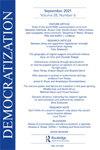Challenging the rules of the game: clientelism and dissent in the Middle East
IF 2.9
1区 社会学
Q1 POLITICAL SCIENCE
引用次数: 0
Abstract
ABSTRACT Since 2010, waves of protest have ebbed and now largely faded across the Arab states of the Middle East, and authoritarian politics there appear to be stronger than ever. Has dissent disappeared, or merely become harder to notice? I argue in this article that clientelism serves as an important locus of latent dissent in the Middle East, one that calls into question the legitimacy of authoritarian regimes, though it often happens away from public view. Employing data from four waves of the Arab Barometer, however, I show that the more citizens perceive clientelism to be prevalent in society, the less likely they are to willingly obey their government when they disagree with it. This finding is most pronounced among those most on the fence about obeying the government in the first place, and during periods in which overt dissent is least apparent. Clientelism beliefs also increase support for democratic alternatives in the most recent data. In addition, while clientelism should increase voting and election-related mobilization, I find inconsistent results across time. This article complicates our current understanding of the role clientelism plays in authoritarian states, and it sheds new light on the “client side” of the patron-client relationship.挑战游戏规则:中东的客户主义和异议
本文章由计算机程序翻译,如有差异,请以英文原文为准。
求助全文
约1分钟内获得全文
求助全文
来源期刊

Democratization
POLITICAL SCIENCE-
CiteScore
6.40
自引率
12.50%
发文量
73
期刊介绍:
Democratization aims to promote a better understanding of democratization - defined as the way democratic norms, institutions and practices evolve and are disseminated both within and across national and cultural boundaries. While the focus is on democratization viewed as a process, the journal also builds on the enduring interest in democracy itself and its analysis. The emphasis is contemporary and the approach comparative, with the publication of scholarly contributions about those areas where democratization is currently attracting considerable attention world-wide.
 求助内容:
求助内容: 应助结果提醒方式:
应助结果提醒方式:


